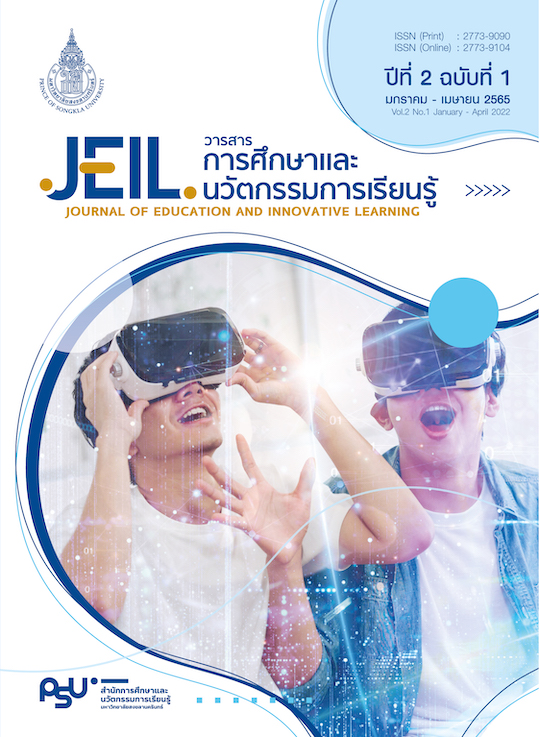การศึกษาเรื่องการเคลื่อนย้ายทางวิชาการและนักศึกษาโมบิลิตี้ ในระดับอุดมศึกษาในประเทศไทย
Main Article Content
บทคัดย่อ
งานวิจัยแบบบุกเบิกชิ้นนี้ มีวัตถุประสงค์เพื่อ 1) อธิบายลักษณะการเคลื่อนย้ายทางวิชาการในประเทศไทย 2) ศึกษาวิธีการส่งเสริมการเคลื่อนย้ายทางวิชาการในระดับอุดมศึกษาในประเทศไทย และ 3) จัดประเภทของนักศึกษาไทยที่เป็นนักศึกษาโมบิลิตี้ เก็บข้อมูลโดยการสัมภาษณ์เชิงลึก กลุ่มตัวอย่างที่ใช้งานวิจัยได้มาจากการเลือกแบบเจาะจงทั้งชาวไทยและชาวต่างประเทศที่มีส่วนเกี่ยวข้องกับการจัดการเคลื่อนย้ายทางวิชาการของสถาบันอุดมศึกษาของประเทศไทย รวม 8 คนและข้อมูลจากเอกสาร วิเคราะห์ข้อมูล 3 ขั้นตอน คือวิเคราะห์แบบจำแนกชนิดข้อมูล วิเคราะห์ส่วนประกอบ และวิเคราะห์โดยการเปรียบเทียบข้อมูล ผลการวิจัยพบว่าการเคลื่อนย้ายทางวิชาการเป็นกิจกรรมในระดับอุดมศึกษาที่นักศึกษา อาจารย์ หรือบุคลากรในสถาบันอุดมศึกษาเดินทางไปศึกษา สอน ทำวิจัย หรือทำกิจกรรมที่มีเป้าหมายเชิงวิชาการในห้วงระยะเวลาหนึ่งในสถาบันอุดมศึกษาอื่นทั้งในและต่างประเทศ สถาบันอุดมศึกษาในประเทศไทยสามารถส่งเสริมการเคลื่อนย้ายทางวิชาการของผู้เรียนได้ 2 รูปแบบใหญ่ คือ โครงการโมบิลิตี้และหลักสูตรถ่ายโอนหน่วยกิต นักศึกษาโมบิลิตี้ คือ นักศึกษาจากสถาบันการศึกษาหนึ่งที่ได้เดินทางเพื่อไปเข้าร่วมกิจกรรมทางวิชาการกับสถานศึกษาคู่สัญญาโดยยังคงสถานะเป็นนักศึกษาของสถาบันการศึกษาต้นสังกัด ผลการวิจัยทั้งหมดได้นำมาสร้างเป็น “กรอบแนวคิดเรื่องการเคลื่อนย้ายทางวิชาการและนักศึกษาโมบิลิตี้” ซึ่งผู้บริหารสถานศึกษา ผู้บริหารหลักสูตรและอาจารย์ระดับอุดมศึกษาในประเทศไทยสามารถนำไปปรับใช้เพื่อส่งเสริมการเคลื่อนย้ายทางวิชาการให้แก่บุคคลากร อาจารย์และนักศึกษาในสังกัดของตนได้
Article Details

อนุญาตภายใต้เงื่อนไข Creative Commons Attribution-NonCommercial-NoDerivatives 4.0 International License.
เนื้อหาและข้อมูลในบทความที่ตีพิมพ์ในวารสารการศึกษาและนวัตกรรมการเรียนรู้ ถือเป็นข้อคิดเห็นและความรับผิดชอบของผู้เขียน ซึ่งกองบรรณาธิการวารสาร ไม่จำเป็นต้องเห็นด้วยหรือร่วมรับผิดชอบใด ๆ และไม่สงวนสิทธิ์การคัดลอกบทความเพื่อใช้ประโยชน์ทางวิชาการ แต่ให้อ้างอิงข้อมูลแสดงที่มาของบทความทุกครั้งที่นำไปใช้ประโยชน์
เอกสารอ้างอิง
Appadurai, A. (1989). Global ethnoscapes: Notes and queries for a transnational anthropology. In R. G. Fox (Ed.), Interventions: Anthropology of the present, (191-210).
Appadurai, A. (1990). Disjuncture and difference in the global cultural economy. Theory, Culture & Society, 7(2-3), 295-310. doi:10.1177/026327690007002017
Casula, M., Rangarajan, N., & Shields, P. (2020). The potential of working hypotheses for deductive exploratory research. Quality & Quantity, 55(5), 1703-1725. doi:10.1007/s11135-020-01072-9
Cojocaru, C. F. (2018). Developing (new) language skills through student mobility - the impact of an Erasmus+ experience. Revista de Științe ale Educației, 37(1), 53-65.
Dolga, L., Filipescu, H., Popescu-Mitroi, M. M., & Mazilescu, C. A. (2015). Erasmus mobility impact on professional training and personal development of students beneficiaries. Social and Behavioral Sciences, 191, 1006-1013. doi:10.1016/j.sbspro.2015.04.235
Engel, C. (2010). The impact of Erasmus mobility on the professional career: Empirical results of international studies on temporary student and teaching staff mobility. International student mobility and migration in Europe Belgeo, (4), 351-363. doi: 10.4000/belgeo.6399
Lincharearn, A. (2012). Qualitative data analysis techniques. Journal of Educational Measurement, 17(1), 17-29. [in Thai]
Mobility. (n.d.). In Merriam-Webster.com dictionary. Retrieved from https://www.merriam-webster.com/dictionary/mobility
Organisation for Economic Co-operation and Development. (2018). Global competency for an inclusive world. Retrieved from https://www.oecd.org/education/Global-competency-for-an-inclusive-world.pdf
Popov, V., Brinkman, D., & van Oudenhoven, J. P. (2017). Becoming globally competent through student mobility. In M. Mulder (Ed.), Competence-based Vocational and Professional Education (1007-1028). Springer, Cham. doi:10.1007/978-3-319-41713-4_47
Richardson, R., & Munday, J. (2013). International student mobility programs and effects on student teachersí perceptions and beliefs about education and their role as future educators. Universal Journal of Educational Research, 1(3), 240-246. doi:10.13189/ujer.2013.010314
Rungwaraphong, R. (2016). Facebook as a portrayal of life: A phenomenological study of Facebook use of Thai students while studying overseas. Phranakhon Rajabhat Research Journal Humanities and Social Sciences, 11(2), 84-98. [in Thai]
Rungwaraphong, R. (2019). Distance mentoring system for students under academic mobility curriculum: A case study of a mobility curriculum of PSU Trang Campus. Journal of Education, Prince of Songkla University, Pattani Campus, 30(2), 136-150. [in Thai]
Sudjanya, C., & Thongkaew, T. (2019). Internationalization: The Importance of Thai Higher Education Institutions on the International Stage. Sukhothai Thammathirat Open University Journal, 32(2), 70-87. [in Thai]
The ASEAN Secretariat. (2016). Master plan on ASEAN connectivity 2025. Indonesia, Jakarta: ASEAN Secretariat. Retrieved from https://asean.org/wp-content/uploads/2018/01/47.-December-2017-MPAC2025-2nd-Reprint-.pdf
Tracy, S. J. (2010). Qualitative quality: Eight ìBig-Tentî criteria for excellent qualitative research. Qualitative Inquiry, 16(10), 837-851. doi:10.1177/1077800410383121
Zhang, X. (2012). Discussion on international internship and intercultural competence from a perspective of higher educational internationalization -- A case study of the Program Work and Travel USA. Cross-Cultural Communication, 8(5), 62-66. doi:10.3968/j.ccc.1923670020120805.934


